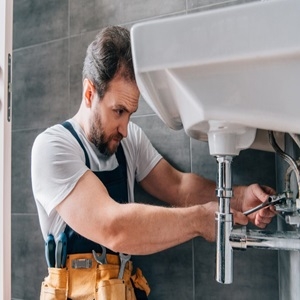Is it legal to work on the plumbing of my own house?Posted by Julia Hope Martins on April 9th, 2024  Plumbing problems in your house can seem daunting. Maybe your faucet drips, or your toilet won't stop running. You think about fixing it yourself. But is that legal? In some places, homeowners can indeed tackle plumbing tasks on their own—within limits. For instance, Massachusetts has strict rules against non-professionals doing plumbing work. This blog will guide you through the dos and don'ts of handling your home's plumbing projects. It covers when you can roll up your sleeves and when to call a pro. Ready to learn more? Let's get started! Key Takeaways
Legal Aspects of Homeowner Plumbing
Homeowners can perform simple plumbing repairs and replacements within their own one-family dwelling without obtaining a plumbing license or permit. However, certain types of plumbing work may necessitate hiring a licensed plumber as per neighborhood regulations. Plumbing License Laws Some states have strict rules about who can fix or change pipes and fittings in a house. Massachusetts, for example, does not let homeowners work on their own plumbing at all. They must hire someone with a professional license. This person has passed exams to prove they know how to safely install tubes and drains according to the building code. On the other hand, Georgia allows people to make small repairs or changes that cost less than 0 without needing any special permission. But even then, it's always best to check local laws because what's okay in one place might not be allowed in another. For more serious projects, most places will require homeowners to get a permit and possibly have the finished work checked by an inspector to make sure everything is up to standard. Permit Requirements Before starting on any plumbing project, homeowners must check if they need a permit. This rule helps keep everything safe and up to code. For small repairs, sometimes you don't need one. But for bigger jobs, like installing a water heater or changing the layout of pipes, it's required. Each area has its own rules about permits. Getting a permit means your plans will be checked by experts before you begin. After finishing the work, an inspector comes to make sure everything is done right. This step is crucial for safety and follows building codes closely. "Safety and compliance are the pillars of good plumbing practice." Types of Plumbing Work Homeowners Can Do
Homeowners can handle simple plumbing repairs and replacements in their own houses. They can also take care of the plumbing within a one-family dwelling. Simple Repair and Replacement Fixing and replacing parts of your house's plumbing system can often be done by you. This is true for a number of tasks that don't need special skills or permits. Here's a quick guide: 1. Fix leaks in faucets and showers. These usually require just basic tools like wrenches and screwdrivers. 2. Replace old or broken faucets in your kitchen or bathroom. You can find new ones at most hardware stores. 3. Change showerheads to improve water flow or save on water usage. It's a simple twist-off, twist-on job. 4. Unclog drains in sinks, tubs, or toilets using plungers or snakes. Chemical cleaners are also an option but use them carefully. 5. Swap out the internals of your toilet tank, such as the flapper and fill valve, to stop leaks or running issues. 6. Install new components under the sink like p-traps and supply lines when they wear out or start leaking. Remember, while handling these projects, always shut off the water supply first to avoid messes. Next up, we'll explore plumbing tasks within a one-family dwelling... Plumbing Within One-family Dwelling When homeowners tackle plumbing within a one-family dwelling, they may engage in various tasks. Here's what they can do: 1. Replace or repair faucets and showerheads. 2. Install new water-saving fixtures, like low-flow toilets and aerators, to conserve water. 3. Replace old and worn - out pipes with modern materials such as PEX or copper tubing. 4. Install new hot water heaters or replace existing ones for better energy efficiency. 5. Repair or replace drain lines and address clogs within the plumbing system. These tasks allow homeowners to maintain their plumbing efficiently while enhancing overall water usage and energy efficiency within their homes. Limitations and RestrictionsHomeowners must comply with local regulations on plumbing work. Certain complex tasks, like installing new pipes or working on gas lines, typically require a licensed plumber's expertise. Plumbing Work Requiring a Licensed Plumber Plumbing work requiring a licensed plumber encompasses tasks like installing new plumbing systems, working on sewer lines, and handling complex repairs. In many states and cities, regulations dictate that certain plumbing jobs must be done by a licensed professional. This includes work involving gas lines, major pipe installations, and septic tank repairs. Additionally, any project that involves significant changes to the existing plumbing system typically requires the expertise of a licensed plumber. Moving on to essential maintenance and repair tasks... Neighborhood Plumbing Regulations Some states require homeowners to obtain a permit and have their plumbing work inspected to ensure it meets building codes. There are specific regulations for homeowners who want to do plumbing work in their own homes, and these vary by location and jurisdiction. Moreover, some states also impose restrictions on the type of plumbing work that can be done without a license. Moving forward to "Essential Plumbing Maintenance and Repair"... Essential Plumbing Maintenance and RepairTo maintain clean water and prevent leaks, homeowners should regularly perform essential plumbing maintenance and repairs. This includes: 1. Inspect and clean drains to prevent clogs. 2. Regularly check for leaks in faucets, toilets, and pipes. 3. Maintain the water heater by flushing it annually to remove sediment buildup. 4. Check for and repair any leaky pipes to prevent water damage. 5. Test the sump pump to ensure it is functioning properly. Let me know if there is anything else I can assist you with! ConclusionIn conclusion, the legality of homeowners doing their plumbing work varies depending on location and jurisdiction. While some places allow homeowners to handle certain types of plumbing work, others have strict regulations against it. It's important for homeowners to research and understand the specific requirements and regulations in their area before undertaking any plumbing work. Being aware of these regulations can help homeowners avoid legal issues and ensure that their projects meet building codes. It is essential to always stay informed about the rules regarding homeowner plumbing to avoid potential problems in the future. FAQs1. Can I legally work on my house's plumbing?Yes, homeowners can usually work on their own plumbing. However, some tasks might require permits or inspections to ensure they meet local codes and regulations. 2. Do I need a license to fix my home's plumbing?For most minor repairs in your home, you don't need a licensed contractor. But for major projects, checking with local authorities is smart—they'll tell you if a professional needs to step in. 3. What happens if I mess up the plumbing in my house?If DIY plumbing goes wrong, it could lead to leaks or water damage. Remember, homeowners' insurance may not cover damage from unpermitted work—always check first! 4. Are there any insurance issues when working on my own plumbing?Working on your own could affect claims; insurance companies often require that licensed professionals do significant work. It’s best to consult your policy or talk to an agent first. 5. Should I hire a professional plumber even for small jobs?While it's okay to tackle some small jobs yourself, hiring a licensed plumber ensures the job meets safety standards and code requirements—it can save time and headaches later. 6. What about bigger projects? Can I still DIY those?Larger projects often involve permits and inspections by law—think adding new pipes or remodeling bathrooms. For these, hiring professionals like general contractors or plumbers who know the ropes is wise—they handle everything from noise ordinances to ensuring fire safety compliance. Like it? Share it!More by this author |




